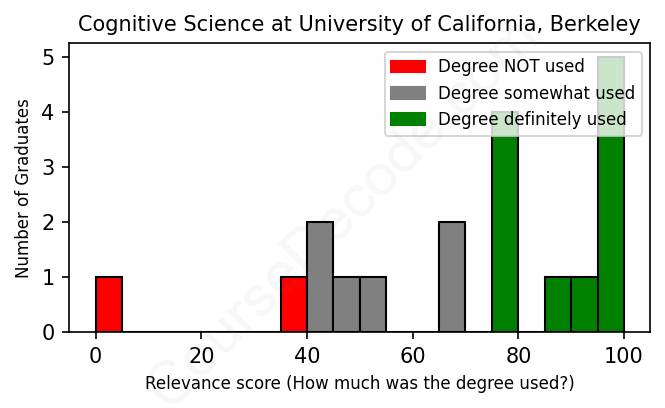
First, some facts. Of the Cognitive Science graduates from University of California, Berkeley we've analyzed , here's how many have used (or NOT used) their degree in their career:

These are estimates based on AI analysis of 19 LinkedIn profiles (see below).
The verdict? Slightly above average. Overall, with an average relevance score of 70%, Cognitive Science graduates from University of California, Berkeley have a slightly higher likelihood (+3%) of finding work in this field compared to the average graduate across all fields:
And for comparison, here's the chart for all profiles we've looked at across all degrees.
Also, after graduating, 42% of these graduates have pursued further education other than another Bachelor's degree (such as a Masters degree or other), compared to the average across all profiles of 35%. This suggests you may need more than just a Bachelors degree to be competitive as a Cognitive Science graduate.
See the details:
|
Relevance score: 100% We think this person has gone into a career highly relevant to their degree. We think this person has gone into a career highly relevant to their degree.
DEGREE INFOGraduated in 2020 from University of California, Berkeley with a Bachelor of Arts - BA in Cognitive Science. Also pursued further education since (see below). JOB HISTORY SINCE GRADUATIONResearch Assistant Language, Literacy, and Learning (L3) Lab Nov 2020 - Jan 2023 Speech-Language Pathologist, Clinical Fellow  Centre for Neuro Skills Oct 2023 - Present FURTHER DEGREES DONE SINCE GRADUATINGMaster of Science - MSKeck School of Medicine of the University of Southern California 2021 - 2023 ABOUTNo information provided. |
The top 10 most common jobs done by the graduates we've analyzed (ranked most common to least) are:
When looking at the career paths of graduates from the Cognitive Science program at UC Berkeley, it's clear that many have found their way into academic research roles. Positions like Research Associates, Postdoctoral Associates, and various research assistant roles dominate the lineup, which makes sense given that cognitive science is a heavily research-oriented field. These jobs are often directly relevant; they allow individuals to apply their knowledge of cognitive principles, research methodologies, and analytical skills acquired during their studies. In particular, roles in educational institutions—like one individual working at Indiana University Bloomington—highlight how cognitive science can be applied practically in both teaching and research settings.
However, not all career choices fit the mold. There are quite a few graduates who have ended up in areas that seem only tangentially related to their degree. For example, positions in retail management or as bartenders focus more on customer service and business management rather than cognitive science. Some roles, such as project management or even marketing positions, might utilize a bit of cognitive insight understanding consumer behavior but don't require deep knowledge of cognitive science. Overall, while many graduates find fulfilling and relevant work in research, other paths—particularly in business and retail—show how diverse career trajectories can still exist for those with a degree in Cognitive Science, even if they don't always tap into the core concepts of the field.
Here is a visual representation of the most common words in job titles for Cognitive Science graduates (this is across all Cognitive Science graduates we've analyzed, not just those who went to University of California, Berkeley):

When looking at the career trajectories of graduates from the Cognitive Science program at UC Berkeley, it seems like a good number of them have landed in fields that are quite related to their studies. For many, the first jobs right after graduation often lean toward research roles or positions in academia. You have graduates taking on roles like research associates and technicians, which makes sense since they’re able to apply their knowledge right away in settings that push the boundaries of cognitive science. Even those entering somewhat different fields soon follow a path that allows them to utilize their analytical and research skills, like management and program coordination roles at tech and science-focused organizations.
Fast forward five to ten years, and it’s interesting to see that some graduates have carved out successful careers within academia or related sectors, continuing as research associates, project managers, or communicators at leading institutions. Others, however, have diverged significantly from cognitive science, finding themselves in roles that range from retail management to software engineering. While this might seem like a mixed bag, many of these positions still require strong critical thinking and interpersonal skills, which cognitive science graduates are known for. Overall, there's a blend of sticking closely to cognitive science-related careers and branching out into various industries, with many graduates seemingly finding their niche in a way that, while not always directly linked to their major, still reflects the skills they developed during their studies.
Honestly, a Bachelor’s degree in Cognitive Science at UC Berkeley isn't a walk in the park—it’s definitely on the challenging side. You’re diving into a mix of psychology, neuroscience, computer science, and philosophy, which means you’ll be juggling quite a variety of subjects and skills. The coursework can be pretty rigorous, with lots of readings, projects, and sometimes tricky quantitative methods involved. Plus, Berkeley has a reputation for being academically competitive, so you'll want to be prepared to really engage and stay on top of your studies. That said, if you're genuinely interested in how the mind works and enjoy exploring different disciplines, it's definitely a rewarding experience, even if it's a bit tough at times!
Most commonly, in the LinkedIn profiles we've looked at, it takes people 4 years to finish a Bachelor degree in Cognitive Science.
From what I can see, a mix of jobs among these UC Berkeley grads suggests they’ve had varying levels of income. Some of them, especially those in research and tech roles, seem to have landed positions that typically pay pretty well—like the ones at Amazon Web Services and Google. Others, like the bartenders and retail workers, probably aren't raking it in as much, especially early on. The postdocs and researchers also get decent pay, but it’s not always on par with tech salaries. Overall, it looks like some are doing quite well while others are still figuring it out, which is pretty normal for a bunch of fresh graduates.
Here is a visual representation of the most common words seen in the "about" section of LinkedIn profiles who have a Bachelor degree in Cognitive Science (this is across all Cognitive Science graduates we've analyzed, not just those who went to University of California, Berkeley). This may or may not be useful:

Here are all colleges offering a Bachelor degree in Cognitive Science (ordered by the average relevance score of their Cognitive Science graduates, best to worst) where we have analyzed at least 10 of their graduates:
| College | Score | Count |
|---|---|---|
 University of California, Berkeley University of California, Berkeley
|
70 | 19 |
 UC San Diego UC San Diego
|
66 | 10 |
 University of California San Diego University of California San Diego
|
60 | 13 |
 University of California, Merced University of California, Merced
|
58 | 10 |